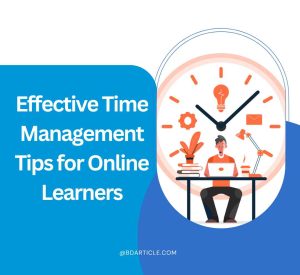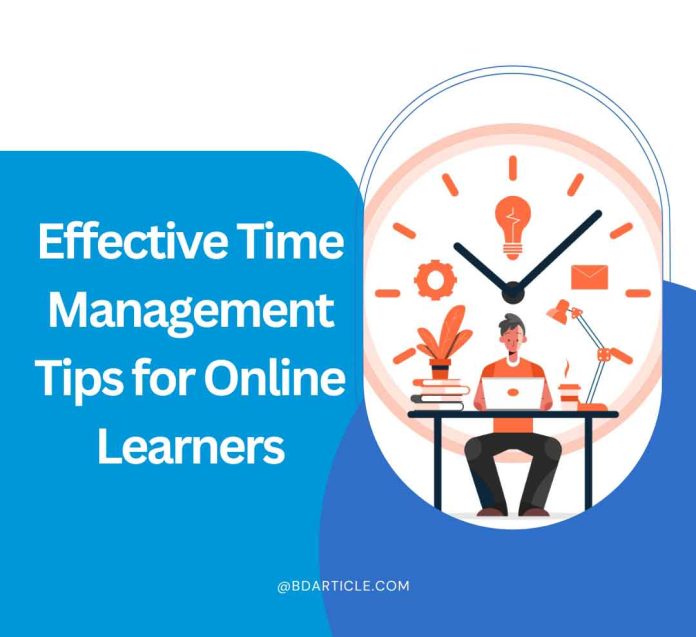Time management is the cornerstone of success, especially for online learners who must balance education with other responsibilities. With the rise of digital education, students often find themselves grappling with deadlines, distractions, and a lack of structure. However, mastering time management tips for online learners can significantly enhance productivity, reduce stress, and pave the way for academic excellence.

-
Create a Dedicated Study Schedule
Online learners thrive when their time is structured. Establishing a consistent schedule helps you allocate time efficiently for coursework, assignments, and self-study.
- Why It’s Important: Without a fixed schedule, procrastination can creep in, leaving you overwhelmed as deadlines approach.
- How to Do It: Break your day into time blocks. Allocate specific hours for learning, breaks, and leisure. Tools like Google Calendar or time-blocking apps can be invaluable.
- Pro Tip: Reserve your peak energy hours for tasks that require intense focus.
-
Prioritize Tasks Using the Eisenhower Matrix
Not all tasks are created equal. Prioritizing your workload ensures that you focus on what truly matters.
- What Is It?: The Eisenhower Matrix categorizes tasks into four quadrants: urgent-important, not urgent-important, urgent-not important, and neither.
- Application: For example, studying for an upcoming test falls under urgent-important, while answering casual emails might be less critical.
- Results: This strategy helps you manage time better and keeps distractions at bay.
-
Minimize Digital Distractions
While online learning offers flexibility, it also comes with its share of distractions—social media notifications, endless browsing, and even household interruptions.
- Techniques to Stay Focused:
- Use browser extensions like StayFocusd to limit time on distracting sites.
- Study in a distraction-free environment.
- Keep your smartphone out of reach during study sessions.
- Mind Mapping Techniques for Students to Boost Learning and Creativity: Consider using mind maps to visualize your goals and track progress. This keeps you organized and motivated.
-
Set Achievable Goals
Breaking down large tasks into manageable chunks prevents burnout and builds momentum.
- SMART Goals: Ensure your goals are Specific, Measurable, Achievable, Relevant, and Time-bound.
- Daily and Weekly Targets: Instead of saying, “I’ll study biology,” aim for, “I’ll complete chapters 3 and 4 of biology by Thursday.”
- Reward Yourself: Small rewards, like a favourite snack or leisure activity, can motivate you to stay on track.
- Use Productivity Tools
The digital age offers an array of tools to help you manage your time effectively.
- Popular Tools:
- Trello or Asana for task management.
- Pomodoro apps like Focus Booster work in focused intervals.
- Evernote for organizing notes and study materials.
- How They Help: These tools streamline your workflow and ensure you don’t overlook critical tasks.
-
Optimize Your Learning Space
Your environment plays a crucial role in your ability to focus.
- Key Elements of an Ideal Study Space:
- Quiet and well-lit area.
- Ergonomic chair and desk setup.
- Limited visual clutter.
- Avoid Studying on Your Bed: It can make you feel drowsy and reduce productivity.
-
Take Regular Breaks
The brain needs downtime to retain information effectively. Overloading yourself can backfire.
- Pomodoro Technique: Study for 25 minutes, then take a 5-minute break. After four cycles, take a longer break of 15-30 minutes.
- Engage in Physical Activity: A quick stretch or walk during breaks can rejuvenate your mind and improve focus.
-
Stay Consistent and Disciplined
Consistency is the secret sauce to mastering time management.
- Why Discipline Matters: Online learning often lacks the accountability of physical classrooms, making self-discipline crucial.
- Tips for Staying Consistent:
- Stick to your study schedule.
- Avoid skipping planned study sessions unless necessary.
- Reflect on your progress weekly and adjust your strategies.
-
Seek Support When Needed
Online learners sometimes feel isolated, but help is just a click away.
- Collaborate with Peers: Join discussion forums or form virtual study groups.
- Reach Out to Instructors: Don’t hesitate to ask for clarifications or extensions if needed.
- Utilize Online Resources: Platforms like Coursera and Khan Academy offer supplemental learning materials.
-
Monitor Your Progress
Tracking your achievements keeps you motivated and on the right path.
- Methods to Track Progress:
- Maintain a journal to jot down daily accomplishments.
- Use apps like Todoist to visualize completed tasks.
- Benefits: Regular monitoring helps identify what works for you and areas for improvement.
-
Practice Self-Care
A healthy mind and body are essential for effective learning.
- Mental Health: Incorporate mindfulness practices like meditation to stay calm and focused.
- Physical Health: Ensure you get adequate sleep, eat balanced meals, and stay hydrated.
- Balance: Set boundaries to separate study time from personal time.
-
Apply Time Audits
If you often wonder where your time goes, auditing your daily activities can provide insights.
- Steps for a Time Audit:
- Record all activities for a week.
- Identify patterns and time-wasting habits.
- Adjust your schedule accordingly.
- Outcome: A time audit helps you reclaim wasted hours and use them productively.
-
Leverage the Power of Accountability
Having someone to hold you accountable can work wonders for your discipline.
- Accountability Partners: Partner with a friend or family member to check in on your progress.
- Use Online Communities: Platforms like Reddit or specialized Facebook groups can offer support and encouragement.
-
Continuously Evaluate and Adapt
What works today may not work tomorrow. Staying adaptable ensures you remain productive.
- Periodic Reviews: Reflect on your goals and strategies every month.
- Stay Open to Change: Be willing to adopt new tools or methods if your current ones aren’t yielding results.
-
Embrace Lifelong Learning
Time management isn’t just for online education; it’s a lifelong skill.
- Cultivate a Growth Mindset: Always seek opportunities to improve your productivity and learning techniques.
- Stay Updated: New time management strategies emerge constantly; stay informed through blogs and courses.
External Resources to Boost Time Management Skills
# Time_management_tips_for_online_learners #Online_learning_productivity #Study_schedule_for_students

